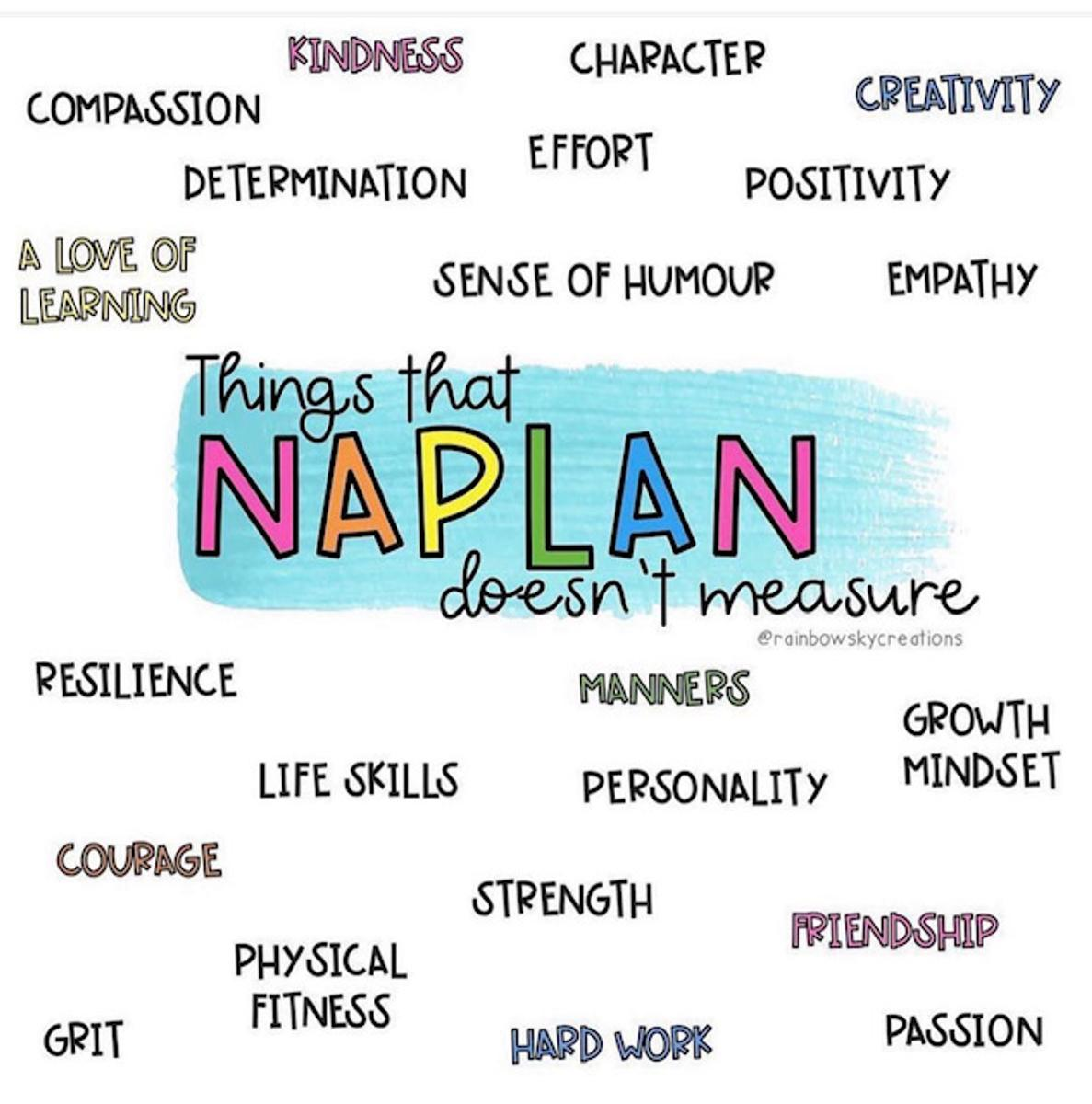Assistant Principal's
News
Ms Fiona Scullion
Assistant Principal

Assistant Principal's
News
Ms Fiona Scullion
Assistant Principal
Over the next fortnight, our students in Years 3 and 5 will complete NAPLAN testing in the areas of literacy and numeracy.
What is NAPLAN?
The National Assessment Program – Literacy and Numeracy (NAPLAN) assesses the literacy and numeracy skills of students in Years 3, 5, 7 and 9. Students participate in NAPLAN tests in writing, reading, conventions of language (spelling, grammar and punctuation) and numeracy. NAPLAN provides an understanding of how individual students are performing at the time of the tests. The tests are just one aspect of a school’s assessment and reporting process – it does not replace ongoing assessments made by teachers about student performance. NAPLAN also provides schools and education authorities with information about how education programs are working and whether young Australians are achieving important educational outcomes in literacy and numeracy.
Over the last 10 years at St Francis Xavier our children have consistently outperformed students across the state, as well as local public, Catholic and independent schools.


All schools in Australia are required to participate annually in the National Consistent Collection of Data for Students with Disability (NCCD). This allows our Catholic sector to continue to provide and prioritise innovative and high-quality teaching and learning to support all students on their learning journey. Above all though, our Catholic tradition demands that educators see every child as equal, inherently sacred and worthy of dignity and respect. Our Catholic schools support children and young people with disability as an act of love, not merely as a legislative requirement.


What is the National Consistent Collection of Data?
The Nationally Consistent Collection of Data on Student School Students with Disability (NCCD) is a process that all schools must complete on an annual basis. It is designed to count the number of students who receive additional adjustments or “help” at school because of a disability. This national data collection helps federal and state governments plan for the needs of students with disability. It is also the way that schools seek and receive funding to support the learning needs of their students.
Who is included in the data collection?
To include a student in the NCCD collection, schools must consider some key questions:
1. Is the student receiving adjustments to assist them with their ability to participate in schooling on the same basis as their peers?
2. Does the student meet the NCCD's broad definition of disability?
3. Has this school discussed the adjustments(help) with the student and/or parent/carer/guardian?
4. Does the school have documentation (assessments, medical reports or other paperwork) about the student’s functional needs, the adjustments (help) that they provided and how the student progressed overtime?
Where the school decides that the four steps above are in place (i.e. the student meets the NCCD criteria), the school then decides the best disability category and how much help (adjustment level) that the student is provided with.
What is the broad definition of disability?
The NCC definition of disability is based on the Disability Discrimination Act 1992 and there are four categories; sensory (e.g. vision / hearing impairment), cognitive, social-emotional and physical.
The definition of disability is very broad and many students that need help at school can be counted in the NCCD. Students with learning disorders e.g. specific learning disability or reading impairment (sometimes referred to as dyslexia), ADHD or auditory processing disorder, chronic health conditions (e.g. epilepsy or diabetes), physical disability (e.g cerebral palsy), vision/hearing impairment and social
emotional disorders (e.g. selective mutism, anxiety disorders, Autism Spectrum Disorder) may be included in the data count.
A formal diagnosis by a specialist may be very helpful for the school but is not needed in the NCCD. A student's inclusion in the NCCD collection is based on professional teacher judgement. Schools can consider school based and external documents to decide if a student can be counted.
What are examples of adjustments?


Students need different types of help at school. Some students need a little help sometimes (minor adjustments) but other students need a lot of help nearly all the time (extensive adjustments). The type of help and support that a school provides is also very different depending on the needs of the student.
The adjustments can include physical changes to the school buildings or grounds (e.g. ramps or special equipment), extra teacher support in classes, special learning programmes, changes to the way the curriculum is presented and delivered or extra adult assistance.
What information is needed about my child?
Schools work together with parents /guardians/carers to understand the needs of each child. Your knowledge of your child's development and learning is important and valuable in this process. It will be very helpful to provide your child's teacher with a copy of any relevant past reports (e.g. from a psychologist, speech pathologist, doctor, Paediatrician, OT etc). these reports will be used with information from your child's teacher, such as information about your child's reading progress or a
Personalised Learning Plan, to build a picture of your child's needs and the help that the school is providing.
How is information collected?
The data collection process involves input from teachers, principals and other school staff working together to consider the data for students with disability in their school, the category of disability and the level of adjustment that best reflects each student’s needs. As a first step, teachers consult with the student and their parent/guardian/carer, to discuss the student’s strengths in the areas where the student needs extra support. This support could be support for their learning, behaviour support, support for medical needs, participation, or other areas where the
student needs extra help. Information collected about the type of adjustments the school is making so that they can participate and learn on the same basis as other students. Documentation, such as diagnostic reports, school reports, parent teacher interviews, Collaborative Planning Meetings and Personalised Learning Plans, will help to provide evidence of the type of support that the school is providing.
What happens to the data? Is it confidential?
All schools must complete the NCCD. Each school principal is required to verify and submit data about students with disabilities in their school during August of each year. The privacy and confidentiality of all students and their families is respected and handled as per the school's Privacy Policy and Collection Notice. Please refer to your schools’ policies for further information.
Do schools require active consent from parents to include students in NCCD?
Amendments were made to the Australian Education Act 2013 and subsequent regulations. As such, schools do not require parents/carers/guardians to provide active consent for students to be included in the NCCD nor is there an option for parents/carers/guardians to request their child not be included (e.g. an opt-out
option.)
Where can I access more information?
Please contact your child's school if you have further questions about the NCCD. Additionally, the following link to the national NCCD Portal may be helpful www.nccd.edu.au.
God Bless,
Fiona